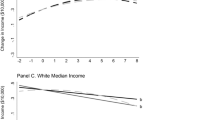Conclusion
The preceding analysis shows that it is possible to give a consistent and meaningful account of postwar changes in the relative position of Blacks as related to broad macrostructural forces operating in the economy as a whole. Of these, perhaps the most commonly recognized are cyclical forces associated with fluctuations in aggregate output and employment. Some support is found here for the role of these forces, though the strength of their effect varies as between earnings and income and between individuals and families. But quite apart from such cyclical factors, there are other powerful factors, of an economic as well as political nature, that have operated to influence the position of Blacks. This analysis has succeeded in isolating some of these other factors.
Similar content being viewed by others
References
A. Adams and G. Nestel, “Interregional Migration, Education and Poverty in the Urban Ghetto: Another Look at Black-White Earnings Differentials,”Review of Economics and Statistics 68 (May 1976): 156–66.
O. Ashenfelter, “Changes in Labor Market Discrimination Over Time,”Journal of Human Resources 5 (fall 1970): 404–30.
R. B. Freeman, “Changes in the Labor Market for Black Americans, 1948-72,”Brookings Papers on Economic Activity 1 (1973): 67–131.
R. B. Freeman, “Black Economic Progress after 1964: Who Has Gained and Why?,” inStudies in Labor Markets, ed. S. Rosen (Chicago: University of Chicago Press, 1981), 247–94.
J. Gwartney, “Changes in the Nonwhite/White Income Ratio — 1939-67,”American Economic Review 60 (December 1970): 872–83.
D. J. Harris, “The Black Ghetto as ‘Internal Colony’: A Theoretical Critique and Alternative Formulation,”Review of Black Political Economy 2 (summer 1972): 3–33.
D. J. Harris, “Capitalist Exploitation and Black Labor: Some Conceptual Issues,”Review of Black Political Economy 8 (winter 1978): 133–51.
J. G. Haworth, J. Gwartney, and C. Haworth, “Earnings, Productivity, and Changes in Employment Discrimination During the 1960’s,”American Economic Review 65 (March 1975): 158–68.
D. Johnson and R. Campbell,Black Migration in America (Durham: Duke University Press, 1981).
T. Kneisner, A. Padilla, and S. Polachek, “The Rate of Return to Schooling and the Business Cycle,”Journal of Human Resources 13, no. 2 (1978): 264–77.
H. Levin, “Education and Earnings of Blacks and theBrown Decision,” inHave We Overcome?, ed. M. Namorato (Jackson, Miss.: University Press of Mississippi, 1979), 79–119.
S. H. Masters,Black-White Income Differentials (New York: Academic Press, 1975).
D. W. Rasmussen, “A Note on the Relative Income of Nonwhite Men 1948-1964,”Quarterly Journal of Economics 84 (February 1970): 168–72.
M. Reich,Racial Inequality, A Political-Economic Analysis (Princeton: Princeton University Press, 1981).
J. P. Smith and F. Welch,Race Differences in Earnings: A Survey and New Evidence (Santa Monica, Cal.: Rand, March 1978).
L. C. Thurow,Poverty and Discrimination (Washington, D.C.: Brookings, 1969).
L. Weiss and J. G. Williamson, “Black Education, Earnings, and Interregional Migration: Some New Evidence,”American Economic Review 62 (June 1972): 372–83.
R. D. Weiss, “The Effects of Education on the Earnings of Blacks and Whites,”Review of Economics and Statistics 52 (May 1970): 159–59.
About this article
Cite this article
Harris, D.J. Economic growth, structural change, and the relative income status of blacks in the U.S. economy, 1947–78. Rev Black Polit Econ 12, 75–92 (1983). https://doi.org/10.1007/BF02873948
Issue Date:
DOI: https://doi.org/10.1007/BF02873948




